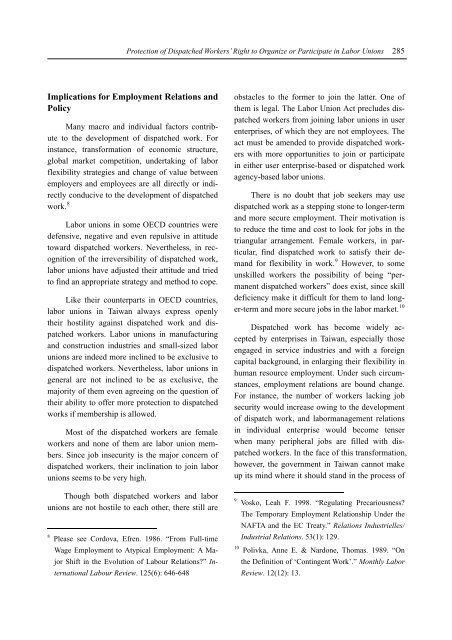PDF(2.7mb) - 國家政策研究基金會
PDF(2.7mb) - 國家政策研究基金會
PDF(2.7mb) - 國家政策研究基金會
You also want an ePaper? Increase the reach of your titles
YUMPU automatically turns print PDFs into web optimized ePapers that Google loves.
Protection of Dispatched Workers’ Right to Organize or Participate in Labor Unions 285<br />
Implications for Employment Relations and<br />
Policy<br />
Many macro and individual factors contribute<br />
to the development of dispatched work. For<br />
instance, transformation of economic structure,<br />
global market competition, undertaking of labor<br />
flexibility strategies and change of value between<br />
employers and employees are all directly or indirectly<br />
conducive to the development of dispatched<br />
work. 8 Labor unions in some OECD countries were<br />
defensive, negative and even repulsive in attitude<br />
toward dispatched workers. Nevertheless, in recognition<br />
of the irreversibility of dispatched work,<br />
labor unions have adjusted their attitude and tried<br />
to find an appropriate strategy and method to cope.<br />
Like their counterparts in OECD countries,<br />
labor unions in Taiwan always express openly<br />
their hostility against dispatched work and dispatched<br />
workers. Labor unions in manufacturing<br />
and construction industries and small-sized labor<br />
unions are indeed more inclined to be exclusive to<br />
dispatched workers. Nevertheless, labor unions in<br />
general are not inclined to be as exclusive, the<br />
majority of them even agreeing on the question of<br />
their ability to offer more protection to dispatched<br />
works if membership is allowed.<br />
Most of the dispatched workers are female<br />
workers and none of them are labor union members.<br />
Since job insecurity is the major concern of<br />
dispatched workers, their inclination to join labor<br />
unions seems to be very high.<br />
Though both dispatched workers and labor<br />
unions are not hostile to each other, there still are<br />
8 Please see Cordova, Efren. 1986. “From Full-time<br />
Wage Employment to Atypical Employment: A Major<br />
Shift in the Evolution of Labour Relations?” International<br />
Labour Review. 125(6): 646-648<br />
obstacles to the former to join the latter. One of<br />
them is legal. The Labor Union Act precludes dispatched<br />
workers from joining labor unions in user<br />
enterprises, of which they are not employees. The<br />
act must be amended to provide dispatched workers<br />
with more opportunities to join or participate<br />
in either user enterprise-based or dispatched work<br />
agency-based labor unions.<br />
There is no doubt that job seekers may use<br />
dispatched work as a stepping stone to longer-term<br />
and more secure employment. Their motivation is<br />
to reduce the time and cost to look for jobs in the<br />
triangular arrangement. Female workers, in particular,<br />
find dispatched work to satisfy their demand<br />
for flexibility in work. 9 However, to some<br />
unskilled workers the possibility of being “permanent<br />
dispatched workers” does exist, since skill<br />
deficiency make it difficult for them to land longer-term<br />
and more secure jobs in the labor market. 10<br />
Dispatched work has become widely accepted<br />
by enterprises in Taiwan, especially those<br />
engaged in service industries and with a foreign<br />
capital background, in enlarging their flexibility in<br />
human resource employment. Under such circumstances,<br />
employment relations are bound change.<br />
For instance, the number of workers lacking job<br />
security would increase owing to the development<br />
of dispatch work, and labormanagement relations<br />
in individual enterprise would become tenser<br />
when many peripheral jobs are filled with dispatched<br />
workers. In the face of this transformation,<br />
however, the government in Taiwan cannot make<br />
up its mind where it should stand in the process of<br />
9 Vosko, Leah F. 1998. “Regulating Precariousness?<br />
The Temporary Employment Relationship Under the<br />
NAFTA and the EC Treaty.” Relations Industrielles/<br />
Industrial Relations. 53(1): 129.<br />
10 Polivka, Anne E. & Nardone, Thomas. 1989. “On<br />
the Definition of ‘Contingent Work’.” Monthly Labor<br />
Review. 12(12): 13.

















